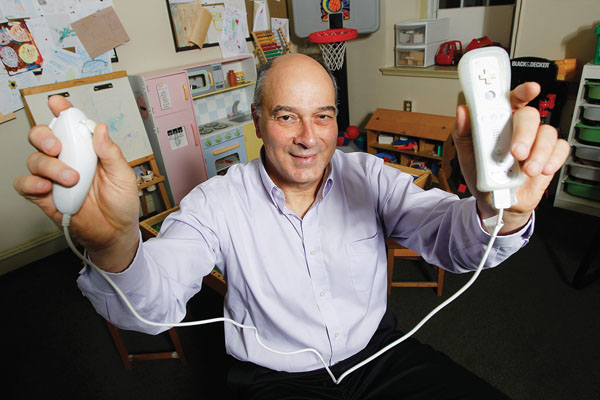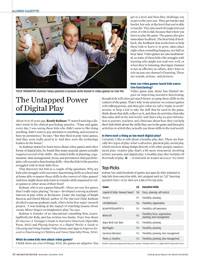Alumni Gazette
 TECH TRANSFER: Kulman helps patients translate skills honed in video games to real life. (Photo: Stew Milne/AP Images for Rochester Review)
TECH TRANSFER: Kulman helps patients translate skills honed in video games to real life. (Photo: Stew Milne/AP Images for Rochester Review)About 10 to 15 years ago, Randy Kulman ’77 started noticing a distinct trend in his clinical psychology practice. “Time and again, every day, I was seeing these kids who didn’t seem to like doing anything, didn’t seem to pay attention to anything, and seemed to have no persistence,” he says. “But they liked to play video games. And they were really good at it. And they were the technology leaders in the house.”
As Kulman started to learn more about video games and other forms of digital play, he found that many popular games actually required several of the skills—the related skills of planning, organization, time management, focus, and persistence that psychologists call executive functioning skills—that the kids in his practice struggled with in their daily lives.
That discovery led him to a couple of big questions. Why are kids who struggle with executive functioning skills at school and at home able to master those skills in the context of video games? And how might those kids learn to transfer skills mastered in video games to other areas of their lives?
Kulman, who is not a gamer himself—“there are very few games that I really enjoy playing,” he says—developed a strong academic interest in play while at Rochester. Under the tutelage of Ralph Barocas and David Elkind, author of The Hurried Child, Kulman decided to pursue graduate study, where in his first major research project, “I was looking at the impact of watching Sesame Street versus Mister Rogers on imaginative play,” he says.
Kulman is founder of an educational consulting firm, LearningWorks for Kids, and has written two books: Train Your Brain for Success: A Teenager’s Guide to Executive Functions (Specialty Press, 2012) and Playing Smarter in a Digital World: A Guide to Choosing and Using Popular Video Games and Apps to Improve Executive Functioning in Children and Teens (Specialty Press, 2014).
What do some kids love about video games?
I think there are a lot of things. First, the games are adaptive. You get to a level and then they challenge you to get to the next one. They get harder and harder, but only at the level that you’re able to handle. They also teach through trial and error. It’s OK to fail, because that’s how you learn to play the game. The games also give immediate feedback. The best kind of feedback, the feedback that works best to help these kids to learn or to grow, takes place right when something happens, not half an hour later. Video games are also multimodal, so some of these kids who struggle with learning who might not read very well, or when they’re listening, that input channel is not as effective as others, don’t have to rely on just one channel of learning. There are sounds, actions, and pictures.
How can video games teach kids executive functioning?
Video game play alone has limited impact on improving executive functioning, though kids will often get much better at using these skills in the context of the game. That’s why in my practice we connect games with talking points, and then give what we call a “make-it-work” section, to help a kid to take the skill that he used in the game, think about that skill, reflect on it, and then do activities that take that same skill in the real world. And that’s why we give information to parents, teachers, and clinicians about how they can help their kids think about the skills they use in the game and then give activities in which they actually use those skills in the real world.
Is there such a thing as too much digital play?
Certainly. I like to talk about a healthy play diet. There are basically five types of play: what I call active, physical play; social play, which involves doing things directly with other people; unstructured play; creative play that’s a bit more structured, involving artistic pursuits; and digital play. A healthy play diet includes all five kinds of play.
—Interview by Karen McCally ’02 (PhD)

